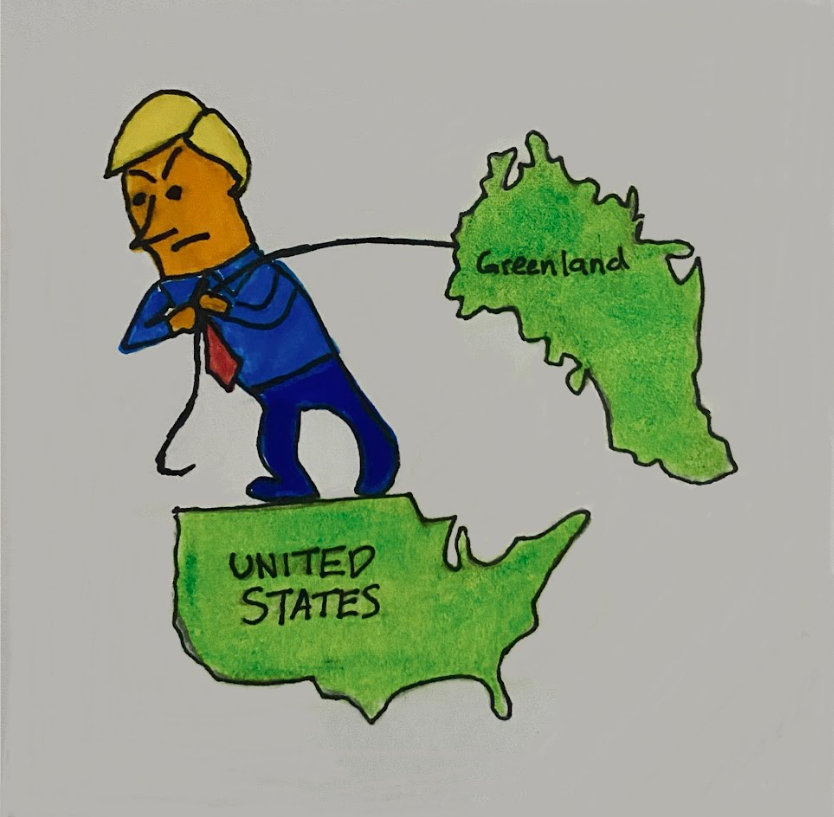If you’ve been hearing a lot of talk about Greenland recently, you’re not alone. President Donald Trump, recently elected to a second term as president of the United States, has repeatedly suggested that the US should make the acquisition of Greenland a top priority. In August of 2019, during his first term, Trump suggested that the US should purchase Greenland from Denmark. At the time, no one thought much of the idea, some even suggesting it to be a joke, but five years later, it has become quite clear that he was not joking. On December 22, 2024, he re-established his interest in owning Greenland in a Truth Social post announcing his nomination of Ken Howery, the co-founder of PayPal, for the position of US Ambassador to the Kingdom of Denmark. In his post, he writes, “For purposes of National Security and Freedom throughout the World, the United States of America feels that the ownership and control of Greenland is an absolute necessity.” On January 7, 2025, when asked in a press conference whether he would rule out the use of military force to obtain Greenland, he responded, “I’m not going to commit to that… It might be that you’ll have to do something.”
According to Donald Trump, US ownership of Greenland is needed to maintain “economic security.” Some people have hypothesized that this is in reference to Greenland’s abundance of natural resources, specifically rare earth metals. These types of metals are becoming increasingly easy to access due to climate change which melts surface ice. Some have also speculated that Trump is interested in drilling for fossil fuels, such as oil and natural gas. It is important to note, however, that in 2021, Greenland issued a ban on offshore oil and gas exploration, citing high extraction cost, disappointing results, and concern for climate change as reasons for the prohibition. If Trump were to purchase Greenland, many fear he would potentially resume fossil fuel extraction, which would worsen the climate crisis. Although Trump has claimed climate change is a subject that is “very important to [him],” he has alternately deemed it to be “mythical.” Trump’s contradictory statements have climate activists worried that he would not hesitate to exploit the environment for natural resources.
Unbeknownst to many is that Trump is not the first United States president to offer to purchase Greenland. In 1946, one year following the end of World War II, president Harry S. Truman’s advisors suggested that he purchase Greenland from the Kingdom of Denmark. Similar to Trump, Truman hoped the island’s strategic location in the Arctic Circle could help defend against foreign threats, specifically Soviet bombers flying through that area. This arrangement wasn’t publicly revealed until many years later after Denmark rejected the offer. However, when the US and Denmark helped found the North Atlantic Treaty Organization (NATO) in 1949, the two countries made arrangements that would allow for the presence of American military bases on the island. One such base, Thule Air Base, is still in use to this day, acting as a deep water port and home to ballistic missile sensors.
While Trump is pushing for the acquisition of Greenland, most residents of Greenland are not on board, and have even been calling for independence from Denmark in recent years. This newfound desire for independence has grown for numerous reasons, including past wrongdoings against native Greenlanders. For instance, in 2022, it was revealed that in the 1960s, 4500 Greenlandic teenage girls had intrauterine devices, a form of birth control, inserted inside their bodies without their consent as part of a birth control study commissioned by the Danish government. In the same year, Danish Prime Minister Mette Frederiksen apologized to the living victims of a 1950s social experiment where 22 Inuit children living in Greenland were taken from their families and brought to Denmark for cultural assimilation and re-education. In part due to revelations like these, Greenlandic Prime Minister Mute Egede has stepped up his push for independence from Denmark. During his New Year speech, Egede asserted, “The history and current conditions have shown that our cooperation with the Kingdom of Denmark has not succeeded in creating full equality… It is now time for our country to take the next step. Like other countries in the world, we must work to remove the obstacles to cooperation—which we can describe as the shackles of colonialism—and move forward.” Becoming a part of the United States, it seems, would be in many ways erasing these efforts by Greenland to escape colonialism. In 2009, the territory of Greenland earned the legal right to gain independence from Denmark through a vote, although they have not yet initiated this change.
As many Greenlanders have been calling for independence, they have also not expressed any desire to become part of the US. In response to Trump’s proposal, Danish Foreign Minister Lars Lokke Rasmussen announced, “[Denmark] fully [recognizes] that Greenland has its own ambitions. If they materialise, Greenland will become independent, though hardly with an ambition to become a federal state in the United States.” Indeed, it does not seem likely that Greenland would opt to become a part of the US, seeing as Egede stated last year that “Greenland is ours. We are not for sale and will never be for sale.”
According to a recent survey conducted by USA Today, the majority of Americans, including Republicans, agree that Donald Trump’s plan to obtain Greenland is either not a good idea or unrealistic. I spoke to an HSMSE student to see where he fell on these issues. When asked what he knew about this issue, Dashiell Finer-Regn (‘27) replied, “From what I’ve heard, it is a strategic kind of purchase to put weapons such as missiles in Greenland so there’s easier access to Russia in the event of an attack.” Considering the fact that Trump has said Greenland is essential for “national security purposes,” citing threats from China and Russia, Dashiell responded that he doesn’t believe it is “entirely illegitimate to think that there are some national security threats posed by China and Russia.” However, he went on to explain that from what he had heard, he doesn’t believe “China’s aggression is focused … on America.” In the case of Russia, on the other hand, he does find there are more “legitimate concerns,” but none that warrant the acquisition of a foreign territory. “We do already have bases in Alaska,” he pointed out, “which is even closer than Greenland to Russia.” As for what other factors may be influencing Trump’s desire to obtain Greenland, Dashiell hypothesized it is “similar to the ‘build the wall’ idea” in that it’s a publicity stunt. Whether Trump intends to follow through on it or not, I do not know.” “To me,” he added, “It seems like it’s never gonna happen, but it gets him headlines and that can be a good tactic for him.” Lastly, when asked if he believed there to be any circumstance in which military or economic coercion would be justified in order to obtain a foreign territory, Dashiell replied that he doesn’t “see any justification for using military force or economic sanctions against Greenland, which is held by a nation that is neutral or in favor of US interests most of the time.”
Despite lack of support from both Greenlanders and Americans, Donald Trump has made it a goal of his presidency to follow through on this promise and has not let up on insisting that Greenland should belong to the United States. Although many believe it to be unlikely that he will accomplish this, it remains to be seen what efforts he would take to make his desire a reality.
























